Richard Gadd on ‘Baby Reindeer’ Phenomenon, Losing Anonymity and What He Won’t Ever Comment on Again
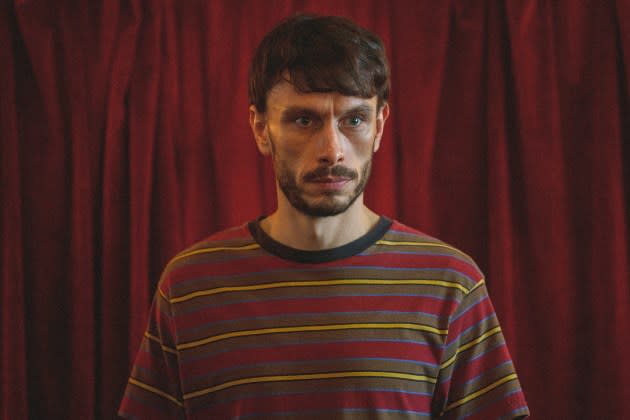
On a recent Friday, Richard Gadd ducked into a London pub before seeing his favorite band the Pogues hit the stage. A quiet night with friends quickly derailed into a fan frenzy to the massive popularity of Netflix’s Baby Reindeer, the critically acclaimed limited series that Gadd created and stars in based on traumatic real-life experiences.
“It was bedlam, it was chaos,” he explains of the scene that unfolded as patrons, one after another, rushed over to share stories about how the seven episodes had affected them. “I thought, ‘Oh, I can’t really go into pubs anymore and expect to sit quietly in a corner and have some food.” A similar situation played out on the plane when Gadd flew to Los Angeles for press and appearances in early May, as the pilots exited the cockpit upon hearing he was a passenger. “That was quite surreal. I still don’t think of myself as famous.”
More from The Hollywood Reporter
While Netflix’s global reach has made anonymity a thing of the past for Gadd, the public is just catching up to what live theater audiences in Scotland and England have long known: Richard Gadd is a sensation. He’s mounted award-winning, one-man shows for years now by mining those traumas — suffering a sexual assault followed by years-long stalking — and translating them for the stage. First came Monkey See, Monkey Do followed by Baby Reindeer, which Netflix picked up as a television adaptation.
The limited series, created by and starring Gadd, casts him as Donny Dunn, a struggling comedian who encounters a lonely woman at the bar where he works. The chance encounter, during which he offers her a free cup of tea, spirals over several months as Martha (played by Jessica Gunning) is revealed to be a dangerous, serial stalker. Over multiple years, she sent him more than 41,000 emails, 744 tweets, 100 pages of letters and 350 hours of voicemails.
During that L.A. trip, The Hollywood Reporter secured 30 minutes on Gadd’s itinerary for a sit-down interview, which covered the epiphany that led him to becoming a performer, how he navigated early failures and why he won’t cast himself in his upcoming TV series for the BBC. The chat, which took place prior to his alleged stalker’s on-camera exclusive with Piers Morgan, also found Gadd opening up about why the real-life identities of his characters is something he plans to shy away from for good: “I don’t think I’ll ever comment on it ever again.”
***
When did you first become aware of performance as an art form?
The turning point for me came when I did a school play. I had these amazing drama teachers [Robin and Patricia], who cared so much. They really encouraged me and wanted me to audition. I didn’t understand Shakespeare at all at that point but I did it anyway and they cast me as Macbeth. I just went on the journey, and started to enjoy learning lines, rehearsing and getting into character. I think we did four shows in the end at the Byre Theatre in St. Andrews [in Fife, Scotland]. I remember it felt like a drug, like adrenaline. I had an epiphany on stage whilst playing Macbeth that I wanted to give it a shot for life.
How old were you at the time?
I was 16.
That epiphany led you to Oxford?
My parents were quite keen for me to go to university. I thought it made sense as well so I could try and get a degree under my belt so if anything happened, I had qualifications to fall back on. I went to Glasgow University for English literature and theater studies but I spent a lot of my time writing plays and performing. That’s where I discovered standup comedy. When university finished, I went to acting school and that’s how I found my way to Oxford School of Drama.
One-man shows have been a big part of your career. At what point did you discover that as a genre or why were you attracted to that type of performance?
It’s something that made sense when I was doing comedy. I did the comedy circuit in the U.K., and it never went very well. The representation of that featured in Baby Reindeer is actually very true to life. I was doing really wacky comedy, it was quite anti-comedy and subversive and a lot of it just didn’t land. Audiences that go to comedy clubs in the U.K. really want something they can rely on, and I was not giving them that.
When it came to creating an act and putting it together over an hour, I felt like I could set an atmosphere when it came to places like the Edinburgh Festival. It’s separate from a comedy night where people show up with preconceived notions of what it was going to be. I had an hour to work with the audience, and the kind of wacky, subversive style seemed to work for a one-man show format. That’s when I noticed my career taking off when I started to express myself over an hour rather than five, 10 or 20-minute comedy sets.
The depiction of those sets in Baby Reindeer made me think about the fearlessness that you must’ve had to stay up there when things were not working. How did you navigate failure?
There was a lot of failure. I just had an innate belief that somehow it would be OK. I actually really struggle with that sort of confidence aspect of performing. I get really, really nervous before I got on stage and I throw up quite a lot before I go out. I could be performing to an audience of five at Aces & Eights in London — a really pressure-off gig — and I’ll be backstage in bits. I’ve always had a brain that leads me to catastrophize the worst possible case scenario, or suggest that I’ll have a death so bad I’ll never able to get over it. I’ve had some pretty bad deaths and gotten over it. Some comedians would refuse to be in a green room with me because my nervous energy was so contagious. I just really believed that I would find something that could strike a chord. To be a good artist, you need to straddle the tight rope between confidence and self-doubt. If you have too much of one, you fall apart. Straddling that line has, in large part, gotten me where I’m at today.
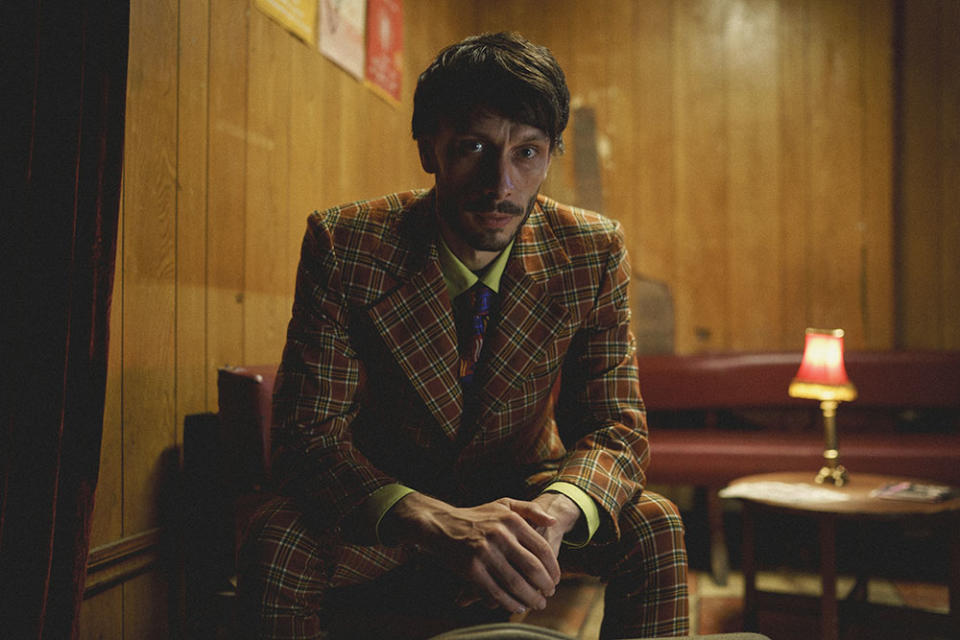
We’ve talked failure, but there was a lot of success. You won a Chortle Student Comedy Award back in 2011, which lead to many awards to come for your one-man shows. How did the recognition impact your work?
Any sort of recognition was much needed at the time. I’ve always, always been a workaholic and poured myself into everything. I’d go to the Edinburgh Festival and I’d have these hit shows that would sell out and be really buzzy. But I always still felt that when September hit and the festival was over, the attention would immediately be off of me again. All the little things along the way — the competition finals and the awards — served as reminders I was on the right track.
Reading back through descriptions of your early work, reviewers called it grindhouse comedy, and one newspaper referenced you as “one of the U.K.’s most exciting, unique and troubled comedians.” How did early shows, like Cheese and Crack Whores, define what kind of performer you wanted to be?
People dubbed those series of shows the grindhouse trilogy, Cheese and Crack Whores, Breaking Gadd and Waiting for Gaddot. The shows were quite punky, in your face, anarchic and pushed the envelope of what was acceptable. I would joke about themes that I was struggling with in real life, be it breakups or abuse, but not in the meaningful way I did later in my career. Back then, I didn’t quite know how to articulate what I wanted to say so I threw everything at the audience in quite a shocking, overwhelming way. They were good shows and I think they were quite funny but my work changed from Monkey See, Monkey Do onwards. I look back on the grindhouse trilogy as me trying to find my footing.
You won a Perrier Award for Monkey See, Monkey Do, a prestigious comedy prize …
Yeah, and I think that’s why Monkey See, Monkey Do was such a seminal moment in my career, if not the most seminal moment. People in the industry would come and see the trilogy and maybe they found it funny and entertaining but there’s no way they could’ve seen me as someone they could put on TV. I think they thought, this guy is got to be mad. With Monkey See, Monkey Do, it brought humanity to my work and contextualized the trilogy in a lot of ways.
When you won, you said, “The worst thing that experience of sexual assault did was take your confidence away from me. Maybe this award will help bring it back.” Did it?
I remember when my name was read out, I just heard screaming and people were all over me. If I could bottle an emotion from my life, just to experience it again, it would be when my name was read as the winner. My brain had been so traumatized because of some of the stuff that had happened to me, but that was a flood of adrenaline. I almost felt my brain move into a different space because of the euphoria. It was like nothing I’d ever experienced before. I took to the stage and was already crying my eyes out. It was true, it had destroyed my self-worth. To have a Perrier, which people consider the Oscars of comedy, it was like, “well, OK, he messed up a lot of things in my life but he didn’t destroy my spirit.”
There was another trauma around the corner with a stalker. Because you had mined personal experience already, at what point during the ordeal did you consider writing about it?
The stalking was at its worst when she managed to get my number. I stubbornly refused to change my number, because I believed it was their responsibility to stop calling me. Then came the voicemails and I listened to them in the hope of expediting the case by finding something threatening. It was weird, I would go to meetings around town and listen to them on the way. The meeting would end and I would put my headphones back in. I would go to bed at night and still hear the echoes of the voicemails. It was almost maddening, hearing the voicemails bouncing around my eyelids. That’s when I thought: if I was ever going to do a show about how awful this experience has been, the first thing I would do would be to take the voicemails and fire them around the stage like an oscillating light display where you would see the words bouncing around. That’s the seed of what later became Baby Reindeer.
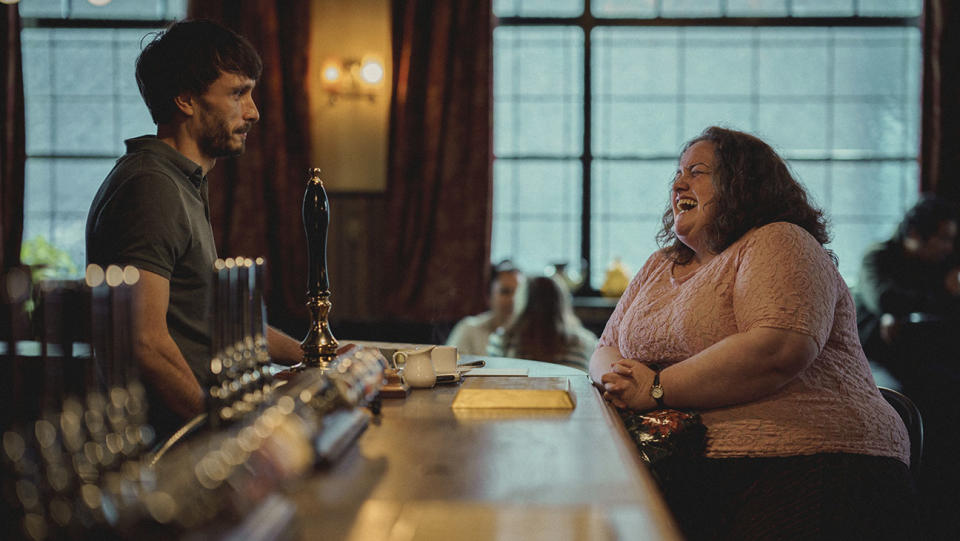
Where did the idea come from to take Baby Reindeer from stage to screen?
It was a Netflix commissioner at the time, Lindsey Salt, who I adore. I owe her everything. She came to see it in Edinburgh and got me in London and said, “If you were to do this as a TV show, how would you do it?” My previous shows weren’t really quite television material but with Baby Reindeer I knew could be an interesting story. It was thrilling, it was tense, it had weird characters. I remember sitting in a room and saying to her the idea, and I left the room and I remember — because they never say it in the room — but I left the room and I remember thinking that went really, really well. I had a feeling that they were going to go for it, but I didn’t expect them to go whole hog to full series commission. It was unbelievable. I thought they might commission a script but they really backed it. I’ll always be grateful for that.
Then what happened?
I went around and took meetings with production companies to see who would be great to develop it with. That took ages. It would’ve been very easy to go to all the major production companies, but I really wanted to meet with anyone interested in me. You never know who is going to surprise you or who is going to have some interesting take. I did about 79 meetings in the end. I kept copious notes of each one, there were so many every single day. It was about six or eight months later that I sat down to write.
What was the hardest day on set?
The Darrien stuff. It was really difficult going back there. I remember going to set for the diary days, the sexual assault days, and we sandwiched them together so it wasn’t so spread out. I think it was the right thing to do, so that it would only be two or three days where we had to stay in that zone. On the way to set those days, I would be hoping for a major traffic jam or something so I could just have another beat to prepare and wrap my head around it to think. The actor who plays Darrien, Tom Goodman-Hill, what a legend. I felt really safe with him, really comfortable. It’s weird to shoot a scene that you know have to shoot but don’t really want to. He was such a pro, such a good actor that he made it so much easier.
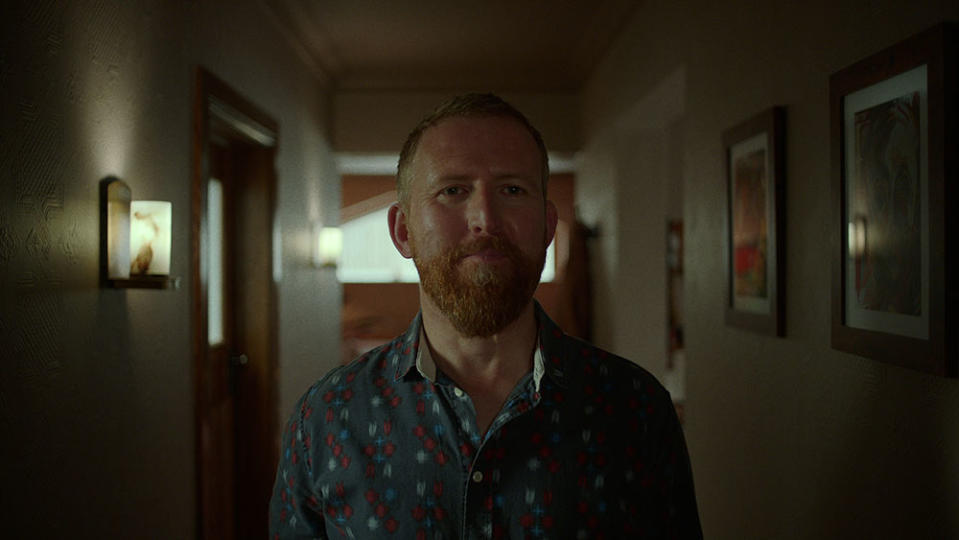
How did you shake it once it was over?
To play Donny Dunn, I had to go back to that head space where I was at the time [in real life], which was very raw and very damaged. I lost a lot of weight because I wanted to feel vulnerable and fragile in my body. I went from 96 kilograms to 68. So, there was a bit of piecing myself back together when the filming process finished. Going back to that stuff is tough. It brings up stuff and makes you feel weird and a bit wonky. Ultimately, I sort of knew where I was striving for in the distance which helped.
You had some notoriety with the success of the stage shows and your work as an actor, but this is completely different. How has your life changed since April 11?
It’s changed a lot and hasn’t changed a lot. I still very much feel like the same person in a lot of ways. I am not very big online, and I don’t post much and I don’t read much. I don’t Google the show or myself. I still keep a quiet life. But I have noticed the crazy part of it, the sudden public attention with people coming up to me and the sudden feeling that there’s more eyes on me all the time. Naturally being a very self-conscious person, it can be quite challenging. I like it when people come up and say nice things. In the weeks after the show came out, I went from 3,000 followers on Instagram to over 400,000 now. It’s surreal. I never expected it to pop like this. I thought maybe it could be a cult success but in terms of the global reach, I feel like I’m going to wake up one day and it’s all been a dream.
I read the comments and spent a fair amount of time researching Richard Gadd, and I can tell you that there have been plenty of people posting that they wanted to give you a hug. What’s been the best, worst or wildest fan encounter so far? Was it weird in the airport?
On the flight over here to L.A., the captain came back because he had heard I was on the plane. He spoke to me and then the other pilot came back, too, so that was quite surreal. I still don’t think of myself as famous. I don’t believe it inside, so when people come up, I still find it quite strange. I went to see the Pogues the other day and I went into a pub beforehand, naively thinking that I could just go in and sit down with some friends. But it was bedlam, it was chaos. People coming up all the time, all the time, sharing stories and talking about the show and how it affected them. I kind of thought, oh, I can’t really go into pubs anymore and expect to sit there quietly in a corner and have some food.
How was the show? I know from digging around on your Instagram that you’ve loved the Pogues your whole life and that Shane MacGowan, in particular, was a huge influence. That made sense to me thinking of your punk rock sensibilities early in your career …
Shane and the Pogues have been massive influences. I bumped into someone at the gig whose boyfriend produced the show so they gave me a backstage pass. I was like, are you kidding me? I’m going to meet the Pogues? I met [Spider Stacy, Jem Finer and James Fearnley] from the Pogues, and all of them had watched the show. I just couldn’t believe it. I posted that I met the Pogues and then they actually posted it to their official Instagram, a picture of them with me, which is just kind of unbelievable. They’ve inspired me so much.
You posted asking people to stop speculating about the real-life identities of the people from the show. That’s not stopped people from interviewing the alleged real-life Martha and reaching out to her. She’s also come out on her own via social media. How closely are you following what she’s been saying? [Editor’s note: This interview was conducted prior to Fiona Harvey’s interview with Piers Morgan.]
I can’t confirm or deny anything relating to the real life people who the characters are based on in the show. I know for every single part, there’s been about five or six people who have been sort of named as each part, even all the way down to the pub manager. The internet’s always going to do its thing. I can’t really comment on that. There was a video the other day of someone had sent me of someone claiming to be Teri. I’d never met them before in my life. The internet just does this thing and I just have to let it do its thing. And that’s that.
How do you respond to stuff like that?
I don’t agree with the sleuth thing. I’ve put out a statement publicly saying I want the show to be received as a piece of art, and I want the show to people to enjoy as a piece of art. I’m called Donny Dunn. It exists in a sort of fictional realm, even though it’s based on truth, it exists in a fictional realm, let’s enjoy the world that I’ve created. If I wanted the real life people to be found, I would’ve made it a documentary. I’ve spoken publicly about how I don’t want people to do it and if I start playing a game of whack-a-mole, then I’m almost adding to it. I don’t think I’ll ever comment on it ever again.
Because it’s landed in the way it has, have you received any comments or praise from performers, creators or actors you admire?
There’s been some crazy stuff. Stephen King has followed the show and written at length about it. I was so surprised, I thought someone had doctored it and sent it to me as a joke. I know that Cardi B has posted about the show. The one that meant the most to me along with the Pogues was actually John Cena. He sent me a private video talking about the show and how much he liked it. I’m a big wrestling fan and a big John Cena fan, so that kind of blew my mind. It meant a lot to me.
You signed with UTA recently. I’m curious where you see your career going next?
I think what I’ll do is finish Lions and then take stock of where I’m at and try to figure out what to do next. Ultimately, I’d love to try and do a film at some point. That would be amazing. I am not saying I have any real concrete ideas for one but I’d like to try and so some acting, not just me writing it.
The show Lions is the BBC. I read that the plot is about two brothers?
It’s six-episodes, about 45-minutes each. It’s about the lifespan of two very dysfunctional brothers and the show takes you through their lives and how they interact. All of the stuff I’ve done as an emotional truth to it, but this is not based on my life at all. It’s a fictional world and a new challenge that I’m really looking forward to.
Will you star in Lions?
No, I’m not going to act in that, for a couple of reasons. For Baby Reindeer, it added a layer of intrigue because it happened to me and I think it made the piece more interesting. But I want Lions to exist as a piece of art, as a piece of work without my sudden recognition getting in the way, which is why we’ll cast people who aren’t me in the principal roles.
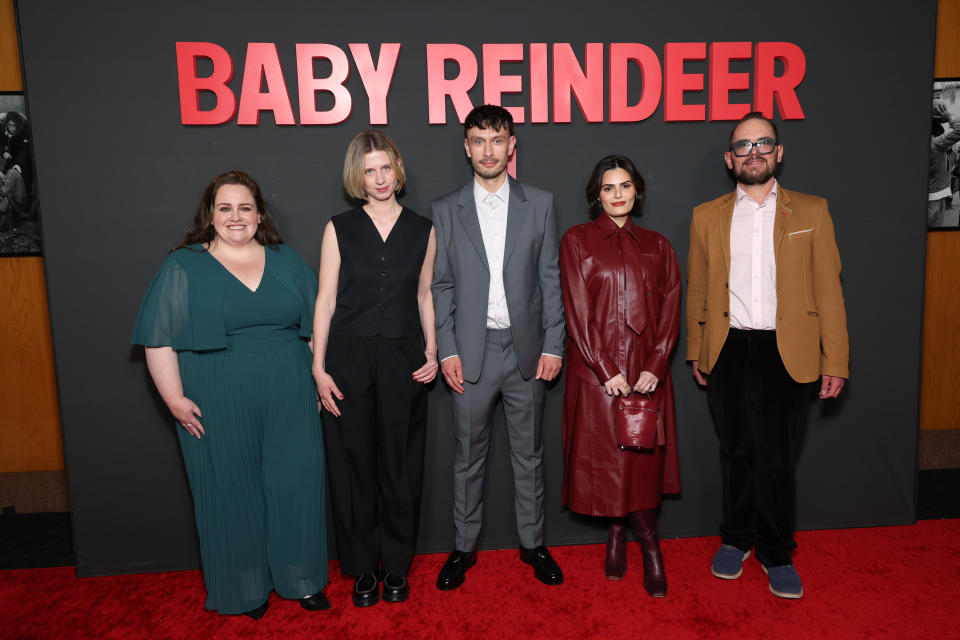
Best of The Hollywood Reporter